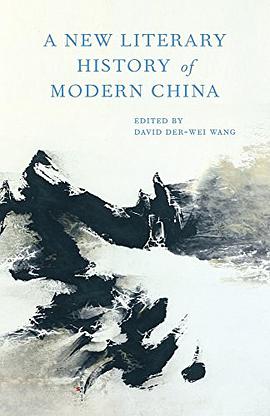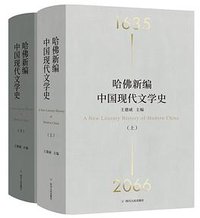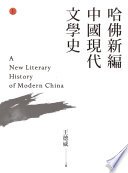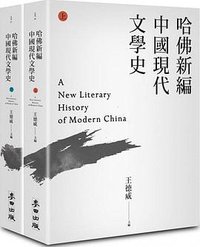A New Literary History of Modern China
豆瓣
David Der-wei Wang (Editor)
简介
Literature, from the Chinese perspective, makes manifest the cosmic patterns that shape and complete the world—a process of “worlding” that is much more than mere representation. In that spirit, A New Literary History of Modern China looks beyond state-sanctioned works and official narratives to reveal China as it has seldom been seen before, through a rich spectrum of writings covering Chinese literature from the late-seventeenth century to the present.
Featuring over 140 Chinese and non-Chinese contributors from throughout the world, this landmark volume explores unconventional forms as well as traditional genres—pop song lyrics and presidential speeches, political treatises and prison-house jottings, to name just a few. Major figures such as Lu Xun, Shen Congwen, Eileen Chang, and Mo Yan appear in a new light, while lesser-known works illuminate turning points in recent history with unexpected clarity and force. Many essays emphasize Chinese authors’ influence on foreign writers as well as China’s receptivity to outside literary influences. Contemporary works that engage with ethnic minorities and environmental issues take their place in the critical discussion, alongside writers who embraced Chinese traditions and others who resisted. Writers’ assessments of the popularity of translated foreign-language classics and avant-garde subjects refute the notion of China as an insular and inward-looking culture.
A vibrant collection of contrasting voices and points of view, A New Literary History of Modern China is essential reading for anyone seeking a deeper understanding of China’s literary and cultural legacy.
contents
Contributors
Map
1. Introduction: Worlding Literary China [David Der-wei Wang]
1635; 1932, 1934: The Multiple Beginnings of Modern Chinese “Literature” [Sher-shiueh Li]
1650, July 22: Dutch Plays, Chinese Novels, and Images of an Open World [Paize Keulemans]
1755: The Revival of Letters in Nineteenth-Century China [Theodore Huters]
1792: Legacies in Clash: Anticipatory Modernity versus Imaginary Nostalgia [Andrew Schonebaum]
1807, September 6: Robert Morrison’s Chinese Literature and Translated Modernity [John T. P. Lai]
1810: Gongyang Imaginary and Looking to the Confucian Past for Reform [Benjamin A. Elman]
1820: Flowers in the Mirror and Chinese Women: “At Home in the World” [Carlos Rojas]
1820, Beijing: Utter Disillusion and Acts of Repentance in Late Classical Poetry [Stephen Owen]
1843, The Second Half of June: In Search of a Chinese Utopia: The Taiping Rebellion as a Literary Event [Huan Jin]
1847, January 4: My Life in China and America and Transpacific Translations [Chih-ming Wang]
1852, 1885: Two Chinese Poets Are Homeless at Home [Xiaofei Tian]
1853: Foreign Devils, Chinese Sorcerers, and the Politics of Literary Anachronism [David Der-wei Wang]
1861: Women Writers in Early Modern China [Ellen Widmer]
1862, October 11: Wang Tao Lands in Hong Kong [Emma J. Teng]
1872, October 14: Media, Literature, and Early Chinese Modernity [Rudolf G. Wagner]
1873, June 29: The Politics of Translation and the Romanization of Chinese into a World Language [Uganda Sze Pui Kwan]
1884, May 8: In Lithographic Journals, Text and Image Flourish on the Same Page [Xia Xiaohong and Chen Pingyuan, translated by Michael Gibbs Hill]
1890, Fall: Lives of Shanghai Flowers, Dialect Fiction, and the Genesis of Vernacular Modernity [Alexander Des Forges]
1895, May 25: The “New Novel” before the Rise of the New Novel [Patrick Dewes Hanan]
1896, April 17: Qiu Fengjia and the Poetics of Tears [Chien-hsin Tsai]
1897: Language Reform and Its Discontents [Theodore Huters]
1899: Oracle Bones, That Dangerous Supplement… [Andrea Bachner]
1900, February 10: Liang Qichao’s Suspended Translation and the Future of Chinese New Fiction [Satoru Hashimoto]
1900, Summer and Fall: Fallen Leaves, Grieving Cicadas, and Poetic Mourning after the Boxer Rebellion [Shengqing Wu]
1901: Eliza Crosses the Ice—and an Ocean—and Uncle Tom’s Cabin Arrives in China [Michael Gibbs Hill]
1903, September: Sherlock Holmes Comes to China [Wei Yan]
1904, August 19: Imaging Modern Utopia by Rethinking Ancient Historiography [N. Göran D. Malmqvist]
1905, January 6: Wen and the “First History(-ies) of Chinese Literature” [Kwok Kou Leonard Chan]
1905: Münchhausen Travels to China [Géraldine Fiss]
1906, July 15: Zhang Taiyan and the Revolutionary Politics of Literary Restoration [Tsuyoshi Ishii]
1907, June 1: Global Theatrical Spectacle in Tokyo and Shanghai [Natascha Gentz]
1907, July 15: The Death of China’s First Feminist [Hu Ying]
1908, February, November: From Mara to Nobel [David Der-wei Wang]
1909, November 13: A Classical Poetry Society through Revolutionary Times [Shengqing Wu]
1911, April 24; 1911: Revolution and Love [Haiyan Lee]
1913; 2011, May: The Book of Datong as a Novel of Utopia [Kai-cheung Dung, translated by Victor Or]
1916, August 23, New York City: Hu Shi and His Experiments [Susan Chan Egan]
1916, September 1: Inventing Youth in Modern China [Mingwei Song]
1918, April 2: Zhou Yucai Writes “A Madman’s Diary” under the Pen Name Lu Xun [Ha Jin]
1918, Summer: Modern Monkhood [Ying Lei]
1919, May 4: The Big Misnomer: “May Fourth Literature” [Michel Hockx]
1921, November 30: Clinical Diagnosis for Taiwan [Pei-yin Lin]
1922, March: Turning Babbitt into Bai Bide [Tze-ki Hon]
1922, Spring: Xiang Kairan’s Monkey [John Christopher Hamm]
1922, December 2: New Culture and the Pedagogy of Writing [Charles A. Laughlin]
1924, April 12: Xu Zhimo and Chinese Romanticism [Michelle Yeh]
1924, May 30: Enchantment with the Voice [Chen Pingyuan, translated by Andy Rodekohr]
1925, June 17: Lu Xun and Tombstones [Wang Hui, translated by Michael Gibbs Hill]
1925, November 9: Mei Lanfang, the Denishawn Dancers, and World Theater [Catherine Vance Yeh]
1927, June 2; 1969, October 7: “This Spirit of Independence and Freedom of Thought…Will Last for Eternity with Heaven and Earth” [Wai-yee Li]
1927, June 4: The Legend of a Modern Woman Writer of Classical Verse [Grace S. Fong]
1927, August 23: Ba Jin Begins to Write Anarchist Novels [Mingwei Song]
1928, January 16: Revolution and Rhine Wine [Pu Wang]
1928: Genealogies of Romantic Disease [Andrew Schonebaum]
1929, September: Gender, Commercialism, and the Literary Market [Amy Dooling]
1929: The Author as Celebrity [Eileen Cheng-yin Chow]
1930, October: Practical Criticism in China [Q. S. Tong]
1930, October 27: Invitation to a Beheading [David Der-wei Wang]
1931, February 7: The Chinese League of Left-Wing Writers, 1930–1936 [Lawrence Wang-chi Wong]
1932: Hei Ying’s “Pagan Love Song” [Andrew F. Jones]
1934, January 1; 1986, March 20: Roots of Peace and War, Beauty and Decay, Are Sought in China’s Good Earth [Jeffrey C. Kinkley]
1934, October–1936, October: Recollections of Women Soldiers on the Long March [Helen Praeger Young]
1935, March 8: On Language, Literature, and the Silent Screen [Kristine Harris]
1935, June 18: The Execution of Qu Qiubai [Andy Rodekohr]
1935, July 28 and August 1: The Child and the Future of China in the Legend of Sanmao [Lanjun Xu]
1935, December 21: Crossing the River and Ding County Experimental Theater [Man He]
1936, May 21: One Day in China [Charles A. Laughlin]
1936, October: Resonances of a Visual Image in the Early Twentieth Century [Xiaobing Tang]
1936, October 19: Lu Xun and the Afterlife of Texts [Eileen J. Cheng]
1937, February 2: Cao Yu and His Drama [Li Ruru and David Jiang]
1937, Spring: A Chinese Poet’s Wartime Dream [John A. Crespi]
1937, November 18; 1938, February 28: William Empson, W. H. Auden, and Modernist Poetry in Wartime China [Q. S. Tong]
1939, October 15: The Lost Novel of the Nanjing Massacre [Michael Berry]
1940, September 3: The Poetics and Politics of Neo-Sensation [Peng Hsiao-yen]
1940, December 19: Between Chineseness and Modernity: The Film Art of Fei Mu [Wong Ain-ling]
1940–1942: Chinese Revolution and Western Literature [Ban Wang]
1941, December 25: Eileen Chang in Hong Kong [Leo Ou-fan Lee]
1942, January 22; 2014, Fall: In War She Writes [Katherine Hui-ling Chou]
1942, March 16: Taiwan’s Genius Lü Heruo [Faye Yuan Kleeman]
1942, May 2–May 23: The Cultural and Political Significance of Mao Zedong’s “Talks at the Yan’an Forum on Literature and Art” [Qian Liqun, translated by Dylan Suher]
1943, April: The Genesis of Peasant Revolutionary Literature [Hui Jiang]
1944, November 14: The North Has Mei Niang [Norman Smith]
1945, August 1: Ideologies of Sound in Chinese Modernist Poetry [Nick Admussen]
1945, August 29: The Enigma of Yu Dafu and Nanyang Literature [E. K. Tan]
1946, July 15: On Literature and Collaboration [Susan Daruvala]
1947, February 28: On Memory and Trauma: From the 228 Incident to the White Terror [Kang-i Sun Chang]
1947: The Socratic Tradition in Modern China [Jingling Chen]
1948, October; 2014, February: The Life of a Chinese Literature Textbook [Joseph R. Allen]
1949, March 28: Shen Congwen’s Journey: From Asylum to Museum [Xiaojue Wang]
1949, 1958: A New Time Consciousness: The Great Leap Forward [Har Ye Kan]
1951, September; 1952, September: The Genesis of Literary History in New China [Yingjin Zhang]
1952, March 18: Transnational Socialist Literature in China [Nicolai Volland]
1952, July: A Provocation to Literary History [Shuang Shen]
1952, October 14: Salvaging Chinese Script and Designing the Mingkwai Typewriter [Jing Tsu]
Late 1953: Lao She and America [Richard Jean So]
1954, September 25–November 2: The Emergence of Regional Opera on the National Stage [Wilt L. Idema]
1955, May: Lu Ling, Hu Feng, and Literary Persecution [Kirk A. Denton]
1955: Hong Kong Modernism and I [Wai-lim Yip]
1956: Zhou Shoujuan’s Romance à la Mandarin Ducks and Butterflies [Jianhua Chen]
1956; 1983, September 20: Orphans of Asia [Chien-hsin Tsai]
1957, June 7: Sino-Muslims and China’s Latin New Script: A Reunion between Diaspora and Nationalism [Jing Tsu]
1958, June 20: A Monumental Model for Future Perfect Theater [Tarryn Li-Min Chun]
1958: Mao Zedong publishes Nineteen Poems and Launches the New Folk Song Movement [Xiaofei Tian]
1959, February 28: On The Song of Youth and Literary Bowdlerization [Yunzhong Shu]
1960, October: Hunger and the Chinese Malaysian Leftist Narrative [Chong Fah Hing and Kyle Shernuk]
1962–1963: The Legacies of Jaroslav Průšek and C. T. Hsia [Leo Ou-fan Lee]
1962, June: Three Ironic Moments in My Mother Ru Zhijuan’s Literary Career [Wang Anyi, translated by Carlos Rojas]
1963, March 17: Fu Lei and Fou Ts’ong: Cultural Cosmopolitanism and Its Price [Guangchen Chen]
1964: The “Red Pageant” and China’s First Atomic Bomb [Xiaomei Chen]
1965, July 14: Red Prison Files [Jie Li]
1966, October 10: Modernism versus Nativism in 1960s Taiwan [Christopher Lupke]
1967: Jin Yong publishes The Smiling, Proud Wanderer in Ming Pao [Petrus Liu]
1967, April 1: The Specter of Liu Shaoqi [Ying Qian]
1967, May 29: The Red Lantern: Model Plays and Model Revolutionaries [Yomi Braester]
1970: The Angel Island Poems: Chinese Verse in the Modern Diaspora [Steven Yao]
1972, 1947: In Search of Qian Zhongshu (1910–1998) [Theodore Huters]
1972–1973, 2: A Subtle Encounter: Tête-bêche and In the Mood for Love [Mary Shuk-han Wong]
1973, July 20: The Mysterious Death of Bruce Lee, Chinese Nationalism, and Cinematic Legacy [Stephen Teo]
1974, June: Yang Mu Negotiates between Classicism and Modernism [Michelle Yeh]
1976, April 4: Poems from Underground [Lucas Klein]
1976: A Modern Taiwanese Innocents Abroad [Clint Capehart]
1978, September 18: Confessions of a State Writer: The Novelist Hao Ran Offers a Self-Criticism [Richard King]
1978, October 3: Chen Yingzhen on the White Terror in Taiwan [Ping-hui Liao]
1979, November 9: Liu Binyan and the Price of Relevance [Perry Link]
1980, June 7; 1996, April, On an Unspecified Day: A Tale of Two Cities [Lingchei Letty Chen]
1981, October 13: Food, Diaspora, and Nostalgia [Weijie Song]
1983, January 17: Discursive Heat: Humanism in 1980s China [Gloria Davies]
1983, Spring: The Advent of Modern Tibetan Free-Verse Poetry in the Tibetan Language [Lauran R. Hartley]
1984, July 21–30: Literary Representation of the White Terror and Rupture in Mid-Twentieth-Century Taiwan [Sung-sheng Yvonne Chang]
1985, April: Searching for Roots in Literature and Film [Michael Berry]
1986: The Writer and the Mad(wo)man [Andrea Bachner]
1987, September: The Birth of China’s Literary Avant-Garde [Yu Hua, translated by Carlos Rojas]
1987, December 24: Gao Xingjian’s Pursuit of Freedom in the Spirit of Zhuangzi [Liu Jianmei]
1988, July 1: “Rewriting Literary History” in the New Era of Liberated Thought [Chen Sihe, translated by Mingwei Song]
1989, March 26: Anything Chinese about This Suicide? [Maghiel van Crevel]
1989, September 8: Trauma and Cinematic Lyricism [Emilie Yueh-yu Yeh]
1990, 1991: From the Margins to the Mainstream: A Tale of Two Wangs [Kyle Shernuk and Dylan Suher]
1994, July 30: Meng Jinghui and Avant-Garde Chinese Theater [Claire Conceison]
1995, May 8: The Death of Teresa Teng [Andy Rodekohr]
1995, June 25: Formal Experiments in Qiu Miaojin’s “Lesbian I Ching” [Ari Larissa Heinrich]
1997, May 1: Modern China as Seen from an Island Perspective [Hsinya Huang]
1997, May 3: “The First Modern Asian Gay Novel” [John B. Weinstein]
1997: Hong Kong’s Literary Retrocession in Three Fantastical Novels [Bonnie S. McDougall]
1997: Representing the Sinophone, Truly: On Tsai Ming-liang’s I Don’t Want to Sleep Alone [Pheng Cheah]
1998, March 22: The Silversmith of Fiction [Chu T’ien-hsin, translated by Kyle Shernuk]
1999, February: The Poet in the Machine: Hsia Yü’s Analog Poetry Enters the Digital Age [Brian Skerratt]
1999, March 28: Sixteen-Year-Old Han Han Roughs Up the Literary Scene [Martin Woesler]
2002, October 25: Resurrecting a Postlapsarian Pagoda in a Postrevolutionary World [Tarryn Li-Min Chun]
2004, April: Wolf Totem and Nature Writing [Karen L. Thornber]
2006, September 30: Chinese Verse Going Viral: “Removing the Shackles of Poetry” [Heather Inwood and Xiaofei Tian]
2007: Suddenly Coming into My Own [Li Juan, translated by Kyle Shernuk]
2008: Writer-Wanderer Li Yongping and Chinese Malaysian Literature [Alison M. Groppe]
2008–2009: Chinese Media Fans Express Patriotism through Parody of Japanese Web Comic [Casey Lee]
2010, January 10: Ang Lee’s Adaptation, Pretense, Transmutation [Darrell William Davis]
2011, June 26: Encountering Shakespeare’s Plays in the Sinophone World [Alexa Huang]
2012: Defending the Dignity of the Novel [Mo Yan, translated by Dylan Suher]
2012, 2014: Minority Heritage in the Age of Multiculturalism [Kyle Shernuk]
2013, January 5: Ye Si and Lyricism [Rey Chow]
2013, May 12, 7:30 P.M.: Lightning Strikes Twice: “ Mother Tongue” Minority Poetry [Mark Bender]
2066: Chinese Science Fiction Presents the Posthuman Future [Mingwei Song]
Credits
Acknowledgments
Index


